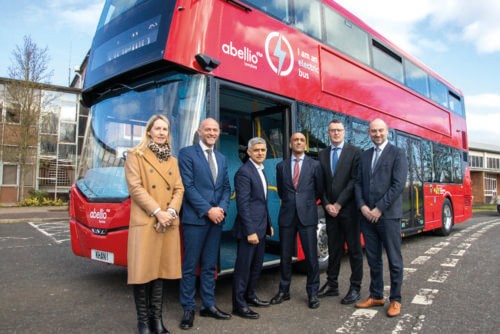Sadiq Khan visited Wrightbus’ Ballymena factory to see the London electric double decker buses being made by the Northern Irish manufacturer, and repeated the importance of TfL receiving long term funding
Mayor of London Sadiq Khan has again urged the Government to provide longer-term capital funding to Transport for London (TfL) to ensure the continued success of the supply chain, which he said supports tens of thousands of jobs across the country. Visiting the Wrightbus factory in Ballymena on 7 March to see the production of new electric double-deck buses which are due to appear on London’s roads in October, the Mayor reiterated how thousands of jobs around the UK linked to major transport projects in London could be at risk if TfL does not get the longer-term funding it needs.
Currently in productaion, the Electroliners ordered by Abellio London are the first electric double deckers to be manufactured for London by Wrightbus and are destined for route 111 between Kingston to Heathrow. They will add another 30 double-deck electric buses to the around 750 electric and zero-emission buses already on the capital’s roads. With sustained Government funding, the Mayor believes London could have a fully zero-emission fleet by 2030. The new buses are a battery electric version of the hydrogen double-deckers first introduced in Aberdeen and which Sadiq launched on London’s streets in June last year.
The Mayor highlighted that a lot of the innovation and technology used for the buses is based in Ballymena, where Wrightbus has a large engineering team of around 90 people in R&D. It also funds 35 research posts at Belfast’s Queen’s University as well as currently employing 25 apprentices, with more being recruited. He also pointed out that contract for these buses is supporting around 800 jobs linked to skilled manufacturing, with plans to now expand the workforce. With increasing demand for zero-emission vehicles, production at the Wrightbus factory has switched from 30% zero-emission buses in 2021 to almost 70% in 2022. Overall production at the factory will be almost double this year compared to last year, the firm said, driven largely by the desire for zero-emission buses.
The Wrightbus factory was cited as a prime example of how TfL’s supply chain stretches around the country, alongside two other main bus manufacturers covering Leeds (Switch), Scarborough and Falkirk (both Alexander Dennis). Orders from London are said to be helping create jobs, capacity and certainty for the wider national zero-emission bus market. Contracts on behalf of TfL as a whole reportedly support tens of thousands of jobs outside London and contribute around £7bn to the UK economy, with 55 pence of every pound spent on London Underground investment going outside of London.
The Government supported TfL through the pandemic with short-term cash injections, which TfL says does not allow it to invest for the future. The operator has repeatedly placed pressure on the Government for a longer-term agreement, with warnings that it could have to plan for a ‘managed decline’ scenario that would see service cuts and bus orders paused.
The Government has now agreed to provide TfL with an outline proposal for capital support this month – but the Mayor insisted that it remains essential that the proposal provides the funding TfL needs to support the transport network in London and the thousands of jobs it in turn supports provides around the UK.
The Mayor said: “Londoners will soon see the all-electric buses we previously ordered built at this Ballymena factory on the capital’s roads, adding to our ever increasing zero-emission bus fleet and illustrating how investment in our capital can support innovation and jobs in green technology across the country. This is a prime example of how TfL’s supply chain stretches throughout the UK, supporting jobs, capacity and certainty for the national move towards a zero-emission bus market, helping to clean up our filthy air. Each new electric bus operating on the streets of London relies on great manufacturing outside our capital and means less reliance on fossil fuels.
“However, as it stands the Government’s short-term funding deals are trapping TfL on life support and putting innovation, economic growth and jobs like this at risk, as well as slowing our efforts to improve energy security. I urge the Government to engage with TfL and City Hall in good faith over the next few weeks so that we can finally agree a fair, longer-term funding deal that will protect London’s transport network – for the sake of the capital and the whole country.”
Wrightbus CEO Buta Atwal said: “We’re proud to be a UK company that is not only supporting the UK’s decarbonisation push thanks to our zero-emission buses, but that is creating and supporting jobs in the UK at the same time. We design and manufacture our buses in Northern Ireland using parts that are, as much as possible, made and sourced in the UK and we directly employ almost 900 people, with many thousands more supported throughout the UK supply chain. As a result, every new Wrightbus-made zero-emission bus for the capital is not just good news for air quality in London, but for jobs across the UK.”
Jon Eardley, Managing Director of Abellio London Bus, which will operate the first of the new Electroliners, commented: “The new electric buses that Abellio is bringing to the capital this autumn will benefit Londoners and support jobs across the UK. This order will continue the commitment to improve the travel experience for customers by adding more state of the art, best-in-class electric buses to the streets of London, cleaning the air and helping to deliver the Mayor’s zero-emission ambition. Here at Abellio we believe that continued and sustained investment in the capital’s zero-emission fleet is essential to attract more people to use public transport, which in turn promotes other modes of active travel. By working in partnership with Wrightbus and leveraging its skills and expertise we’ve co-produced a great vehicle for a great city, which everyone can be extremely proud of.”


